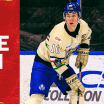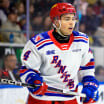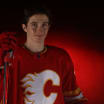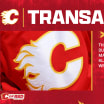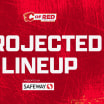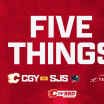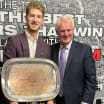Both these gentlemen are, to use a description that's largely gone out of style, just … nice. Really nice.
Tom Hanks-as-Everyman nice. Wally and Beaver Cleaver's All-American-dad Ward nice. Mr. Rogers-in-a-subdued-cardigan nice.
FLAMES EXTRA - JERSEYS TO SUITS
From the ice to offices, Conroy and Gelinas remain key players for the Flames
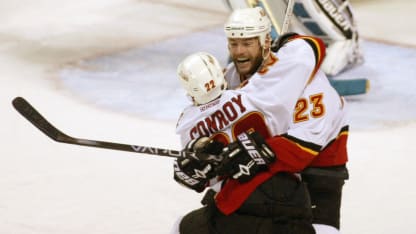
By
GEORGE JOHNSON @GJohnsonFlames / calgaryflames.com
Personable. Approachable. Popular. Accommodating. Recognizable.
All-Time Nice-Guy Team nice.
The morning Craig Conroy announced his retirement, Feb. 4, 2011 to take on the role of special assistant to GM Jay Feaster, came only hours after the Flames had arrived home via charter flight from a game in Atlanta.
The conference room was jam-packed.
Teammates. Trainers. Office staff.
The works.
"It wasn't a question - everybody wanted to come,'' explained pal Jarome Iginla of the standing-room-only turnout. "Everybody was, like: 'Absolutely.
"Which is cool."
Also the ultimate tell.
When the uber-popular Martin Gelinas was brought on board to round out Bob Hartley's coaching staff two years after that, a particularly florid scribbler wrote: "Like Mary Poppins, he's practically perfect."
While Gelinas instinctively rolled his eyes at the complimentary comparison, everyone else with even a passing acquaintance of the man was checking on the sly for any sign of a nearby umbrella or a bottomless carpet bag from which a full-length hat track could be extracted.
Over the ensuing years, they have both successfully segued lengthy on-ice careers into management and coaching roles, respectively.
"Playing,'' Gelinas is saying on this practice day at the Scotiabank Saddledome, "is the best job in the world.
"Hands down.
"You train, you prepare, you go out and compete, it's a game, it's fun, it's what you know, people are watching, people you don't even know tap you on the back and say: 'Way to go.'
"I mean, in those circumstances who wouldn't love to go to work every day?
"So it's thebest job in the world …"
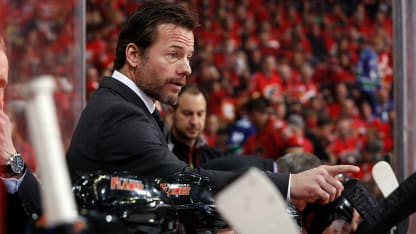
Flames' captain Mark Giordano, noticing Gelinas chatting alongside this writer, pokes his head around a door for a little teasing.
"Tell him,'' he hollers, "how you were The Eliminator back in 2004, Marty!"
After fixing Giordano with a mock glare of reproach, Gelinas sighs. Then takes a long, slow gaze of comfortable familiarity around the dressing room.
"And this … this is the second best job in the world."
Conroy may beg to differ.
Since fast-tracking into management, of course, the onetime captain of the club has been elevated to assistant GM. He's tutored under the auspices of first Feaster, then, briefly, Brian Burke and now Brad Treliving.
The initial jolt of discomfort in making the transition from jersey to suit, he admits, took a measure of getting used to.
"At first, honestly, I didn't know how to act,'' is the frank admission. "Jarome and I are buddies right?
"But for whatever reason, I didn't feel right talking to him. Just, I dunno … awkward. I mean, it's crazy, we're still part of the same team.
"One day I'm walking through the room, eyes front, and he's like: 'Hey, this is ridiculous. OK, you're in management now but you can still say good morning. You're still Craig. Still an easy guy to talk to. It's not going to work if you pretend to be someone you're not.'
"Best advice I got."
For Conroy, at 39, the conclusion of a run that peaked with the 2004 trip to the Stanley Cup final arrived after he'd been waived by the Flames and left unclaimed. Awaiting him was on-the-job-training courses in the schools of the salary-cap, trade negotiation, and prospect evaluation.
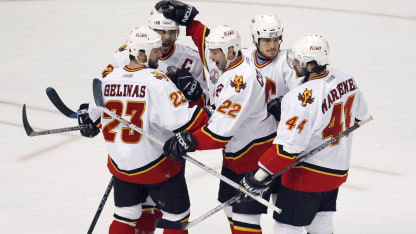
"The hardest part for any player,'' says Gelinas, "is to know when and how. As you get older those questions dog you more and more.
"My career lasted 19 years. So that's all I knew, really. Hockey. As much as you think you're learning, getting into some small businesses, trying to branch out a bit while you're playing, the game is still the centre of your life."
The end for the 1990 Stanley Cup champion arrived after blowing out a knee in his first and only season in Nashville.
"I remember (GM) David Poile called in me in at exit meetings and said: 'Marty, what do you want to do after hockey?'
"Subtle hint, huh?
"Not in a bad way, though. I love Mr. Poile.
"In my head, I was not ready yet but it started to make me think. I told him I wanted to get my knee back in shape. I was older, never been hurt before, you start to get a little scared.
"Then I caught a call from Mr. Poile asking me how about a PTO in the minors. I'd never played in the minors. Didn't feel right. So I went to Europe" - signing for SC Bern. Played there four months but those four months helped me with the 'OK, this is it' transition."
Gelinas, like Conroy, experienced no non-hockey gap in his workaday life, spending his first four post-playing years inside the Predators' player-development umbrella.
"I talked to enough guys who left the game for three, four, five years and and then wanted to - and couldn't - find a way back in,'' says the '04 OT hero to a generation in this town. "Unless your name is Trevor Linden, that's pretty tough to do."
What may seem absurdly simple from event level becomes rather more complicated at office level, as it turns out.
"Coming into the job,'' Conroy laughs, "I had all these ideas - we'll do this and that and everything will be great - but to actually see how hard it actually is to make a trade, to initiate real change? An eye-opener, believe me.
"You're a player, you just think: 'C'mon. We need to add something here. We need to help ourselves. Why are they sitting on their a-es up there not doing anything?'
"These things can take months. At first, you're naive, you believe it's as simple as: 'I like your player, you like my player - Done, right?' Wrong."
Of the course of their collective careers, these two men can boast over 2,300 regular-season and nearly 230 playoff games. Been on the winning, and losing, end of Stanley Cup finals series.
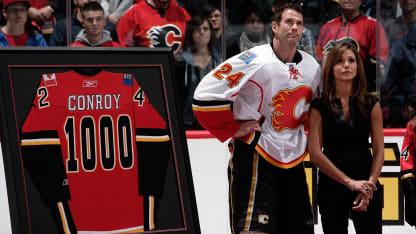
"The one good thing about someone like me moving into a job like this,'' says the assistant GM, "is that when guy turns the puck over, I can empathize. It happens. You've done it yourself. Often. I wasn't an all-star. I played in the minors. I had to work. There wasn't the start of any training camp that I felt comfortable.
"People have said I'm too soft on the players. Well, I know playing is a hard job, too. I'm like: 'Do you think they want to make that mistake?!'"
In an effort to absorb the totality of the business side of the game, Conroy began to multi-task. Talent assessment, player development, hitting the road - icy highways, numbingly-familiar airports - to bird-dog.
He even hopped over the boards to help out coaching on Hartley's invitation during the work-stoppage shortened 2012-2013 season.
"Craig's travelling with the team more this year,'' says president of hockey ops Brian Burke, a mentor. "He's done a lot of amateur and pro scouting. And he's jumped in with both feet.
"I think he's done a really good job of transitioning to the talent side of the business. His assessment side of the business is very sound.
"He knows everybody. You've gotta have a network. The guys who are successful usually have a broad network around the league and he's got that.
"I think the future's really bright for him."
For both.
"You start off learning from players,'' Gelinas says. "I was lucky enough to begin my career in Edmonton surrounded by … legends. Messier and so on.
"As you get older, you begin to appreciate coaches more. I loved Pat Quinn. He was firm but fair. I had a lot of old-school coaches, the We're-Going-To-Beat-You-To-Death guys.
"Pat was a player's coach. Big presence. Smart man. Got the most out of everybody.
"I have a lot of respect for Barry Trotz, having played for him in Nashville. And I was lucky enough to be coached by Alain Vigneault in junior.
"I'm learning from Gully now. I learned from Bob (Hartley). Every day you learn a little bit. It never stops.
"My dad was a barber. My dad, every day, he went to work and he'd try to make people laugh, engage people, tried to be personable.
"I think there are a lot of people who go to the shop, go to the office, and they're not thinking about getting better, not .
"They're just trying to get through the day, 9 to 5.
"I'm lucky. I have a job where I'm constantly looking for ways to be better."
Getting better, finding a way, in the highly-completive world of pro sports involves trial and error, implementation and discard.
"With Brian here,'' says Conroy, "it's nice because he's been around for so long, and he's straight with his answers. I bug him so much I'm sure he wishes I'd just go away.
"I'd ask him, for instance, how often he called other GMs. Jay was more methodical. Brian said he'd get on the phone once a week. Pat Quinn, on the other hand, would sit in the weeds, wait for other teams to come to him. Brad makes a lot more calls than anyone I've ever seen.
"There is no right or wrong. Brian told me I had to find out the way that works best for me."
Gelinas, too, experienced his share of fundamental challenges in making a switch.
"For me, the hardest part was the teaching part. I knew in my head how to do things. But how do you present it? Making sure everything's clear, that the players understand the drills.
"It's like anything else, three, four, five years go by and it becomes routine.
"If you're in charge of the powerplay or the PK or whatever, you've got this group. It's not one individual but if one individual is not going then everything's affected. So you've got to make sure everyone's on board, everyone understands.
"That's not as simple as it sounds.
"This year's been very good for me, watching Dave Cameron. He took over the powerplay this year and the first part of the season … it was not working. But every day he kept approaching it the same way, he did not get rattled, did not change everything up just for the sake of change.
"And we have a really good powerplay now."
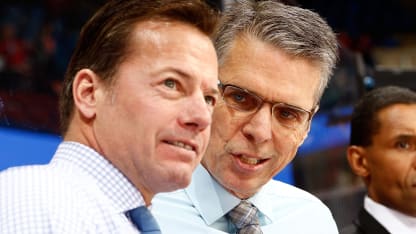
The wins and the losses - the bottom line in a bottom-line business - don't get any more satisfying or deflating after retirement.
Quite the contrary, in fact.
"I think,'' reckons Gelinas, "that you take it more personally as a coach. Look, as a player I wanted to win, I hated to lose, but my job, what I prepared for, was to do that job. My job.
"You did that to the best of the ability, say you score a goal or two, but you lose. You could go home and say 'I'm not happy we lost,but…' As a coach, there's no but.
"As a coach, you take it hard. The great part is, win or lose, the next morning comes around and you just gotta get ready again."
In Conroy's line of work, too, the anxiety levels have escalated exponentially since retirement.
"More stress? Oh, 100 per cent. No doubt about it. As a player, you can go out and make a hit, score a goal. There's something tangible you can do. Up there?" He points skyward to the press box. "You're hoping. Please win the draw. Please kill the penalty. C'mon guys, we need this powerplay goal in the worst way.
"The wins and losses, for whatever reason … you really let them affect you. In this job, you're always thinking: 'Is there something we can do to help? Is there something the guys need? Is they're something we'renot doing right?'
"But there are really, really rewarding times.
"You're there when we drafted Johnny, drafted Sven (Baertschi), drafted Sam Bennett. You want these guys to do so well.
"So when you see Monny score 30 goals. You see (Matthew) Tkachuk come in and contribute in so many facets of the game right away. (Tyler) Parsons win a gold medal. (Jon) Gillies.
"Or take a guy like (Garnet) Hathaway. Undrafted. To see how hard he worked in the American league to reach the NHL, that's exciting.
"You've watched their evolution so you're really invested."
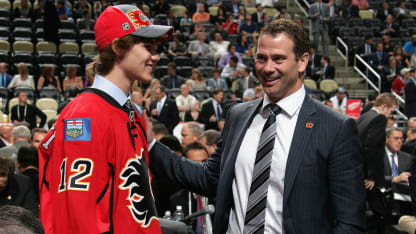
Conroy's long-term goal is to one day be a general manager somewhere, have the 'assistant' removed from his business cards. Gelinas continues to find the coaching end of the game ever more rewarding.
Good people. Solid pros.
As well as All Time All Nice-Guy Team first-teamers.
Being likeable, though, is too often unfairly equated with being soft, unwilling or unable to weird the hammer when necessary, loathe to make the 'tough' decisions required in coaching and management positions.
"No problem,'' replies Conroy. "Jarome used to say: 'You've got 'em all fooled Craig. Everybody thinks you're such a good guy.'
"And, actually, I like to think I am.
"But if you're not doing what you're supposed to be doing, taking advantage of a situation, not doing your job, being disruptive or selfish, I've got no problem with you moving on.
"I've been traded, I've been sent to the minors, so I have sympathy, yes. But this is also a business. We're here to win.
"And I'm going to do whatever it takes to do that, to make the Calgary Flames better."
Gelinas, too.
"I try,'' he once said, discussing his personalty in relation to the current phase of his career, "to live my life honest.
"So at the end of the day, if I have to be hard and then I'm not, I'm not being honest and so I'm cheating everybody else in this room."
Conny and Gelly.
Personable. Approachable. Popular. Accommodating. Recognizable.
Both transitioning successfully into different phases of their respective careers.
Nice.




